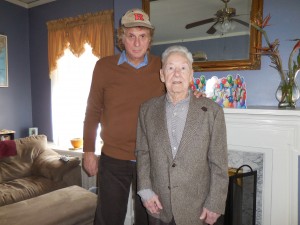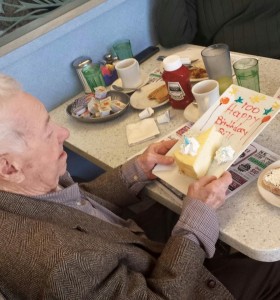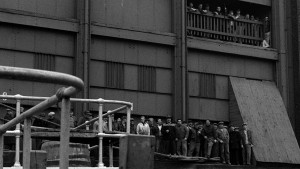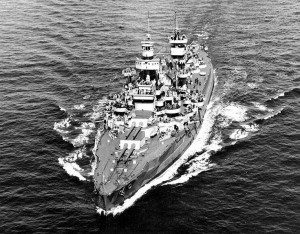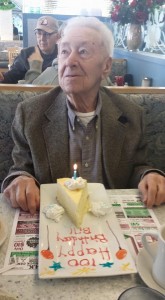Hold On To A Moment: A Journey to Jersey Centenarians: A Blog Series: Meet William Theodore Zimmerman; World War II Veteran March 16, 2015 Calvin Schwartz
For years, I’ve been watching Willard Scott’s segment on ‘The Today Show’ where the face of a centenarian (100 years or older) appears on a jar of jelly for a brief moment while he recites a sentence or two about their lives; perhaps mentioning a life style or diet which helped longevity. For decades, I’ve observed that life is for the living. As soon as you can’t shoot hoops, or drive at night, or put eye drops in, or remember President Kennedy, it may be time for assisted living or a nursing home or an obscure room in a finished basement; out of sight, mainstream and utilization. Invisibility is a factor. It’s hard to notice seniors on the beach, in a mall or at a football game; but they’re there. How often are they engaged? These are heavy thoughts. I hope to capture them all; they’ve been floating around my sensibilities since 1965 when I was a student at Rutgers College of Pharmacy. Sitting in the back of a lecture hall, doodling in a notebook, I decided not to age traditionally; a long story and my upcoming second novel.
Lately, I’ve been thinking about all those relatives who’ve passed and how it seems I didn’t hold them longer and embrace time. Fists are clenched in a futile gesture of wishing for a few more moments; if only. A few months back, I came to the stark realization that I am the family patriarch now. How did that happen?
A long winding road has taken me from pharmacy and eyewear careers to writing and journalism and rock music with a few green rooms for socialization. It’s like I want to yell, “Hey Mah, look no hands and I fit in perfectly and I’m the oldest one.” A few years ago, I was invited to journalistically cover the 101st birthday party for Emily Cook. We became friends and I eventually interviewed her on camera for national media; she invited me back to her room on camera. (Video link available) That was a special moment for me; she was vital, funny, worldly, out-spoken and replete with knowledge and experience wanting to share. I went to her next birthday party and visited during the year as a friend. Her Herbert Hoover and Depression stories fascinated. The lesson was how precious, energetic and insightful she was and that I could learn from her; Use it or lose it deal.
All of the aforementioned are the yellow brick road components to my journalistic journey to meet and absorb our precious centenarians in an on-going series and eventually a novel (book). And now, meet William Theodore Zimmerman.
As a Jersey journalist, I was thrilled to be in the shadow of Rutgers stadium, an area rich in colonial history, interviewing a centenarian in a house that was built in 1830; all key energetic ambiance factors for me. Then Warren Zimmerman, from the State Theater in New Brunswick, escorted his father William Theodore Zimmerman, the 100 year old birthday boy into the living room. William was perfectly appointed wearing a herring bone sport coat; his big family party was an hour later. There was no way William was 100; maybe 80. Once we started talking, I was convinced he was a few decades younger. His voice resonated with a certain excitement, authority and youth.
“How does it feel to be 100?” “No different.” He chuckled. I asked what he did for a living. He was quick to answer, smiling coyly. “I am nothing. All I am is a Jack of All Trades and a Master of None. I did everything you can imagine.”
“Years ago, you only worked as long as they needed you. I worked in the shipyards of Hoboken. You went down there and got picked out of a crowd to do a job. Maybe you got three days of work; maybe one. If you were a good worker, they picked you more often.” All of a sudden I had a flashback of Marlon Brando and the movie, ‘On the Waterfront,’ which took place right where William worked.
“You grew up in the Depression?” What I liked about interviewing William, was his ever-present smile and rapid fire responses. He is so sharp; a gift. “There’s a lot of difference between a Depression years ago and today. The whole country was in a depression and everybody was poor with no work. It was a hard time to get food. In the city where we lived (North Bergen) if you couldn’t buy food, you didn’t eat. When we finally moved to Piscataway, my mother had three or four acres so we grew our own food.”
I always get a kick out of asking about President Herbert Hoover akin to my son asking me about President Kennedy. “I was a kid. How much did I know about politics? I thought he was good. But we had to move a lot when we ran out of money and couldn’t pay rent. We searched around and hired a horse and wagon to move our stuff. There was no car.” The horse reference was like a gentle reality slap to my face to snap out of it. William really went back 100 years.
There was a chronological order to my planned interview. Next was World War II although Warren mentioned a few days earlier that his father never talked about the war. But then William started to talk with a special vigor. “I was in the Navy. This guy tricked me. I was a welder and worked for GM then. GM got a big contract to teach employees different things. They taught me chrome-moly welding; then the war. I enlisted in the Navy. I said to the guy that I was taught welding. I have a certificate which I didn’t get yet. He said don’t worry about it. They were going to give me rate of third class petty officer. He tricked me right into it.” Then I had another movie flashback thinking of Goldie Hawn, in ‘Private Benjamin’ when she was tricked into thinking the Army accommodations were like Club Med.
William was in the Navy for 3 ½ years. He worked up to 2nd class ship fitter. I asked if he saw any action. He laughed loudly. “Quite a bit. I was on the battleship Arkansas. When I first got on, they told us convoy duty taking cargo and people to Europe.” Once again I had a flashback. Coincidentally, a month earlier, I watched the ‘Victory at Sea’ series from the 1950’s featuring the music of Richard Rodgers. An hour show was devoted to convoys and their ever-present danger from German subs.
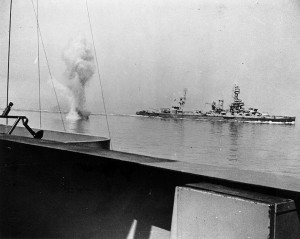
A heavy German coast artillery shell falls between USS Texas and USS Arkansas while the two battleships engage the German battery in Battle of Cherbourg just as William described.
“Then they talked about the coming invasion.” William’s peaking enthusiasm at this juncture made me think I was talking to a 40 year old. “They put us into the New York Navy Yard and rebuilt our ship which was built in 1914. The biggest guns we had was 12” and we didn’t have the 16” like newer ships. Now we became a fighting ship. Then the invasion; our target was Juno beach. Since we were an older ship, they told us because our big turrets shot only so far, that we had to beach our ship and then fire. The Germans were fortified. We figured the end of us. We got there at 3 AM and opened fire at day break. Then when we opened fire, we did so well; we got orders not to beach it. After the invasion, Cherbourg was a powerful German fortress and we got orders with the (USS) Texas and other ships to go in and draw their fire.” Being a good reporter, I went to Google and checked out his story. William was right on. I even found a picture of the Arkansas and Texas being fired upon. He is so sharp.
After a while they shipped William and the Arkansas to the Pacific. “We went to Guam and Iwo Jima where they put the flag.” I knew it’s one of the most famous military pictures. “That was our target 2 ½ miles off the coast. We saw the flag. It was beautiful. After Iwo Jima we went to Okinawa but I’m not sure if it’s the right order. Then we were in a typhoon. Then we were supposed to go to Japan but they dropped the bomb.” William reinforced my memory of President Truman deciding to drop the bomb rather than risk all those American and Japanese lives during a prolonged land invasion.
When William came home, a lot of people wanted him to talk about the war but he wanted to forget. “So many people were killed but it had to be.” He also realized he was on the luckiest ship. He told me about D-Day and the German planes flying so close overhead, he could see their large swastika. He was up on deck manning a 3” anti-aircraft gun. The next day they heard that a German plane had a bomb on it that got stuck and crashed and exploded. “It could’ve sunk us.”
It was time to change subjects. “What do you like best about New Jersey?” “Everything; I love New Jersey.” The biggest change for William was population growth. Being a movie buff, I had to tap into his history. He laughed when I mentioned movies. “I have to laugh. Charley Chaplin used to tickle me. I got a kick out of him and Harold Lloyd, the guy with glasses. Jerry Lewis was very talented.” William likes all kinds of music and the big bands like Glenn Miller and Dorsey. He plays a little piano, played football in Weehawken, basketball and tennis as well but doesn’t like hockey because “all they do is fight.”
He reiterated all the jobs he had working for GM, Ford, Rutgers Prep, floorcovering, home improvements. He helped build his mother, sisters and his own house. “I don’t know how I had all this energy or lived this long. I don’t know how good vitamins are. What I did all my life was listen to my parents.”
We were winding down our time together. The front doorbell rang as party guests started to arrive. He volunteered this next segment. “Bill, what can I do to live as long as you? Women especially asked that.” He chuckled when he said that. What a sense of humor. “I had two good parents, two good wives. I did everything in moderation; everything but smoke. My mother was a practical nurse who hated smoking. My generation; we were poor but happy. My parents taught us religion. We didn’t always have to go to church; you have it in your home. Just look at my two boys. There is a supreme being; too many miracles in this world.”
Miracles; a good word to finish my time with William; It fit perfectly. I’ve got to come up with reasons to spend more time with him. We hugged and I thanked him. Then I told him the one word in my mind from the beginning of our hour; enchanting. And he is perfectly so.

 Follow
Follow